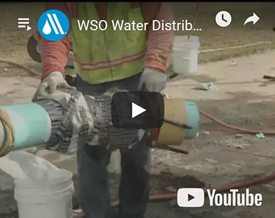Operator Certification Training: Hope For The Future Of Water

As the anticipated retirements of an aging utility workforce are raising concerns among water utilities nationwide, the issue of attracting, training, and retaining qualified replacements grows more urgent. To help water industry managers, employees, and prospective employees protect the public welfare, the industry offers a variety of certification guidance and assistance to get utilities where they need to be.
Many States, Many Standards
The Safe Drinking Water Act (SDWA) and the Clean Water Act (CWA) establish national treatment standards for public drinking water systems and limitations on discharges from wastewater treatment plants. Ironically, however, certification of employees who manage the processes at those facilities is not administered under a comparable federal umbrella program. Each state is responsible for certification standards within its own borders.
A Snapshot Of Certification Needs
A 2018 AWWA report titled “Operator Licensing Requirements Across The United States” condenses a lot of useful information about water utility certification into one convenient resource. It is for individuals considering a career in water utilities, recent hires, water utility professionals seeking advancement or looking to transfer their knowledge and experience to a new state, or water utility management.
The Guide outlines water treatment and wastewater treatment requirements and standards for all states plus Puerto Rico, the Commonwealth of the Northern Marianas Islands (CNMI), and the Navajo Nation — including links to each entity’s webpage for water/wastewater operator requirements. It addresses certification training and experience requirements, renewal, and potential reciprocity with certifications from other states. It also includes references to operator in responsible charge (ORC) and operator in training (OIT) requirements where appropriate.
AWWA provides numerous resources for training and test preparation — including a free mobile app for studying on the go — to help individuals meet unique state requirements. Beyond an initial free sample of test questions, additional study guides of 500 questions each are available for $19 per set.
Standardized Assessment And Training Resources
One attempt at a unified approach to standardized operator certification was the development of the Professional Operator Certification by the Association of Boards of Certification (ABC). The goal was to create a voluntary standard as a means of raising performance levels nationwide. According to its website, the ABC currently serves “almost 100 certifying authorities, representing more than 40 states, 10 Canadian provinces and territories, as well as several international and tribal programs (Figure 1). These programs have certified more than 240,000 water and wastewater operators, laboratory analysts, plant maintenance technologists, biosolids land appliers, and backflow prevention assembly testers.” The ABC also collaborates with leading industry associations — AWWA and WEF — to connect water utility operators with training resources to prepare them for certification testing.


Artwork reprinted with permission from AWWA Copyright © 2018. All rights reserved.
Figure 1. The state of water treatment operator certification across the U.S. is a variable mix of exclusive state requirements and ABC need-to-know-criteria (NTKC). In addition, reciprocal acceptance of certification across state lines is highly variable.
A Full Toolkit Of Training Opportunities
- U.S. EPA. Search this EPA compilation of workforce fact sheets by state or utility name to learn more about specific local learning opportunities.
- ABC Study Guides. These links to AWWA and WEF study resources, certification preparation, and a practice test can be used to help employees quantify their readiness for certification testing.
- Sacramento Manuals. This historically popular training series offers CDs, correspondence courses, and online operator training opportunities for drinking water, wastewater, management, application-specific math training, and more.
- Circuit Rider Program. Aside from formal training specifically for operator certification, operators in qualifying smaller rural water systems can request hands-on assistance and training from the Circuit Rider Program supported by U.S. Department of Agriculture (USDA) Rural Development. This program can boost the competence and confidence of newer plant operators struggling with a first-time emergency experience.
While the academic community continues to debate the merits of distinct learning styles — visual, aural, verbal, physical, logical, social, solitary — certain individuals do express preferences in how they feel most comfortable about learning. For those who believe that they are better visual learners or physical (hands-on) learners, training programs for water utility operator training and certification come in multiple formats — books, videos, webinars, and one-on-one training opportunities. Helping employees be more comfortable with the learning experience can improve their confidence and test performance. The AWWA offers a series of resources aimed at easing several of the more common fears about certification testing.
- Videos. For those who feel more comfortable learning by seeing rather than by reading, the AWWA training video/DVD catalog covers everything from customer education, to workplace recruiting, to safety, water quality and treatment, distribution systems, wastewater treatment, and more. For those working specifically toward plant operator certification, there are also videos on everything from source water, to coagulation and flocculation, to taste and odor, to filtration (Figure 2). (View sample videos here.)
Image reprinted with permission from AWWA Copyright © 2016. All rights reserved.
Figure 2. The AWWA catalog contains more than 100 video titles covering all aspects of water treatment, water distribution, and wastewater treatment operations.
- Overcome Math Anxiety. Even relatively prepared water treatment operators can experience a twinge of anxiety when faced with the prospect of having to answer “math” questions on an exam.
- Operator Math Made Easy I & II (DVD)
- Math For Water Treatment Operators
- Math For Distribution System Operators
- Find The Right Balance Of Chemistry. AWWA also offers support on the basics of chemistry as they relate to water treatment operations.

